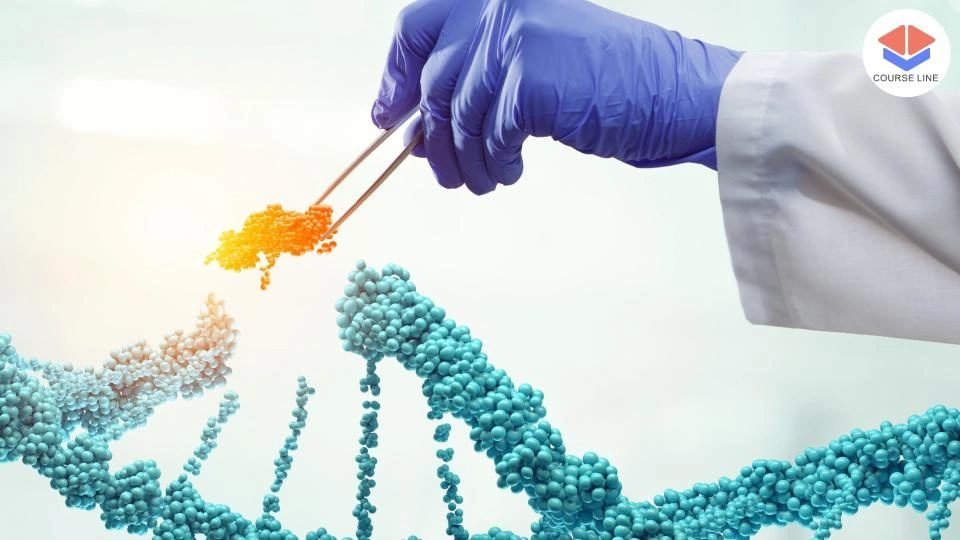Course Features
Price
Study Method
Online | Self-paced
Course Format
Reading Material - PDF, article
Duration
4 hours, 5 minutes
Qualification
No formal qualification
Certificate
At completion
Additional info
Coming soon
- Share
Overview
The Molecular Biology Level 3 Advanced Diploma is designed for those interested in gaining an in-depth understanding of molecular biology and its applications in various scientific fields. The course begins with an exploration of the central dogma of molecular biology, offering students a solid foundation in the structure and function of DNA, RNA, and proteins. By delving into the principles of genetics and inheritance, students gain a comprehensive understanding of how genetic information is passed down through generations.
As the course progresses, students will become familiar with laboratory techniques commonly used in molecular biology, such as PCR, gel electrophoresis, and DNA sequencing. The course further covers recombinant DNA technology, gene expression analysis, and molecular markers. These essential skills are complemented by advanced topics in molecular genetics, including epigenetics, gene regulation, genetic variation, mutations, and genetic diseases, providing students with the tools to analyze genetic data and interpret complex results.
In addition to the theoretical and practical knowledge, the course highlights the applications of molecular biology in biotechnology and medicine, including genetic engineering, biopharmaceuticals, and bioprocessing. Cutting-edge technologies, such as CRISPR-Cas9 gene editing, are also explored. Students will gain hands-on experience in molecular biology research methodologies, conducting experiments, and presenting their findings. Ethical and regulatory considerations in molecular biology research are also covered, ensuring students understand the responsibilities and ethical issues involved in modern scientific research.
Who is this course for?
The Molecular Biology Level 3 Advanced Diploma is designed for those interested in gaining an in-depth understanding of molecular biology and its applications in various scientific fields. The course begins with an exploration of the central dogma of molecular biology, offering students a solid foundation in the structure and function of DNA, RNA, and proteins. By delving into the principles of genetics and inheritance, students gain a comprehensive understanding of how genetic information is passed down through generations.
As the course progresses, students will become familiar with laboratory techniques commonly used in molecular biology, such as PCR, gel electrophoresis, and DNA sequencing. The course further covers recombinant DNA technology, gene expression analysis, and molecular markers. These essential skills are complemented by advanced topics in molecular genetics, including epigenetics, gene regulation, genetic variation, mutations, and genetic diseases, providing students with the tools to analyze genetic data and interpret complex results.
In addition to the theoretical and practical knowledge, the course highlights the applications of molecular biology in biotechnology and medicine, including genetic engineering, biopharmaceuticals, and bioprocessing. Cutting-edge technologies, such as CRISPR-Cas9 gene editing, are also explored. Students will gain hands-on experience in molecular biology research methodologies, conducting experiments, and presenting their findings. Ethical and regulatory considerations in molecular biology research are also covered, ensuring students understand the responsibilities and ethical issues involved in modern scientific research.
Requirements
The Molecular Biology Level 3 Advanced Diploma is designed for those interested in gaining an in-depth understanding of molecular biology and its applications in various scientific fields. The course begins with an exploration of the central dogma of molecular biology, offering students a solid foundation in the structure and function of DNA, RNA, and proteins. By delving into the principles of genetics and inheritance, students gain a comprehensive understanding of how genetic information is passed down through generations.
As the course progresses, students will become familiar with laboratory techniques commonly used in molecular biology, such as PCR, gel electrophoresis, and DNA sequencing. The course further covers recombinant DNA technology, gene expression analysis, and molecular markers. These essential skills are complemented by advanced topics in molecular genetics, including epigenetics, gene regulation, genetic variation, mutations, and genetic diseases, providing students with the tools to analyze genetic data and interpret complex results.
In addition to the theoretical and practical knowledge, the course highlights the applications of molecular biology in biotechnology and medicine, including genetic engineering, biopharmaceuticals, and bioprocessing. Cutting-edge technologies, such as CRISPR-Cas9 gene editing, are also explored. Students will gain hands-on experience in molecular biology research methodologies, conducting experiments, and presenting their findings. Ethical and regulatory considerations in molecular biology research are also covered, ensuring students understand the responsibilities and ethical issues involved in modern scientific research.
Career path
The Molecular Biology Level 3 Advanced Diploma is designed for those interested in gaining an in-depth understanding of molecular biology and its applications in various scientific fields. The course begins with an exploration of the central dogma of molecular biology, offering students a solid foundation in the structure and function of DNA, RNA, and proteins. By delving into the principles of genetics and inheritance, students gain a comprehensive understanding of how genetic information is passed down through generations.
As the course progresses, students will become familiar with laboratory techniques commonly used in molecular biology, such as PCR, gel electrophoresis, and DNA sequencing. The course further covers recombinant DNA technology, gene expression analysis, and molecular markers. These essential skills are complemented by advanced topics in molecular genetics, including epigenetics, gene regulation, genetic variation, mutations, and genetic diseases, providing students with the tools to analyze genetic data and interpret complex results.
In addition to the theoretical and practical knowledge, the course highlights the applications of molecular biology in biotechnology and medicine, including genetic engineering, biopharmaceuticals, and bioprocessing. Cutting-edge technologies, such as CRISPR-Cas9 gene editing, are also explored. Students will gain hands-on experience in molecular biology research methodologies, conducting experiments, and presenting their findings. Ethical and regulatory considerations in molecular biology research are also covered, ensuring students understand the responsibilities and ethical issues involved in modern scientific research.
-
- Understand the central dogma of molecular biology. 00:10:00
- Explore the structure and function of DNA, RNA, and proteins. 00:10:00
- Introduce the principles of genetics and inheritance. 00:10:00
-
- Familiarize students with common laboratory techniques, including PCR 00:10:00
- Explain the principles of recombinant DNA technology and cloning. 00:10:00
- Introduce gene expression analysis and molecular markers. 00:10:00
- Explore advanced topics in genetics, including epigenetics and gene 00:10:00
- Discuss genetic variation, mutations, and genetic diseases. 00:10:00
- Analyze genetic data and interpret results. 00:10:00
- Explore molecular biology research methodologies. 00:10:00
- Design and conduct experiments in molecular biology. 00:10:00
- Analyze and present research findings. 00:10:00
- Exam of Molecular Biology Level 3 Advanced Diploma 00:50:00

No Reviews found for this course.
Is this certificate recognized?
Yes, our premium certificate and transcript are widely recognized and accepted by embassies worldwide, particularly by the UK embassy. This adds credibility to your qualification and enhances its value for professional and academic purposes.
I am a beginner. Is this course suitable for me?
Yes, this course is designed for learners of all levels, including beginners. The content is structured to provide step-by-step guidance, ensuring that even those with no prior experience can follow along and gain valuable knowledge.
I am a professional. Is this course suitable for me?
Yes, professionals will also benefit from this course. It covers advanced concepts, practical applications, and industry insights that can help enhance existing skills and knowledge. Whether you are looking to refine your expertise or expand your qualifications, this course provides valuable learning.
Does this course have an expiry date?
No, you have lifetime access to the course. Once enrolled, you can revisit the materials at any time as long as the course remains available. Additionally, we regularly update our content to ensure it stays relevant and up to date.
How do I claim my free certificate?
I trust you’re in good health. Your free certificate can be located in the Achievement section. The option to purchase a CPD certificate is available but entirely optional, and you may choose to skip it. Please be aware that it’s crucial to click the “Complete” button to ensure the certificate is generated, as this process is entirely automated.
Does this course have assessments and assignments?
Yes, the course includes both assessments and assignments. Your final marks will be determined by a combination of 20% from assignments and 80% from assessments. These evaluations are designed to test your understanding and ensure you have grasped the key concepts effectively.
Is this course accredited?
We are a recognized course provider with CPD, UKRLP, and AOHT membership. The logos of these accreditation bodies will be featured on your premium certificate and transcript, ensuring credibility and professional recognition.
Will I receive a certificate upon completion?
Yes, you will receive a free digital certificate automatically once you complete the course. If you would like a premium CPD-accredited certificate, either in digital or physical format, you can upgrade for a small fee.
Course Features
Price
Study Method
Online | Self-paced
Course Format
Reading Material - PDF, article
Duration
4 hours, 5 minutes
Qualification
No formal qualification
Certificate
At completion
Additional info
Coming soon
- Share
Criminology & Profiling 360 From Theory to Investigative Practice
Course Line247£490.00Original price was: £490.00.£14.99Current price is: £14.99.Property Management in UK
Course Line238£490.00Original price was: £490.00.£14.99Current price is: £14.99.Transportation Safety and Compliance
Course Line238£490.00Original price was: £490.00.£14.99Current price is: £14.99.





